
Pro Evolution Soccer 2010
Written by: Rik
Date posted: January 27, 2018
- Genre: Sport
- Developed by: Konami
- Published by: Konami
- Year released: 2009
- Our score: 6
There are times in life when you realise that something has changed forever, or that a particular phase has come to an end: the last time you’ll see someone, or do something. When my friend and flatmate PG moved out nearly 10 years ago, it was that kind of time. Someone I was used to seeing every day was leaving the country and we’d be lucky to see each other once a year from now on. It was also the end of that time of life where sitting around, drinking beer and playing games until the early hours of the morning was a perfectly acceptable (and attainable) weekday activity.
Not only did it make our occasional Guitar Hero battles a thing of the past (to this day even a few bars of Wolfmother’s Woman or Carry On My Wayward Son by Kansas prompt an automatic and involuntary exclamation of “Oh No!” from my wife) but it also meant the end of our long-running Pro Evolution Soccer rivalry. On the day he moved out, we played a quick couple of games of PES 6 (I won the last one – just had to mention that, again) and then, with a handshake, a hug and a few words, it was all over.
Pro Evo, as most fans came to know it, was my twenties, and the 00s in gaming, for me. The series’ peak years coincided with a time when I had the time and inclination to play regularly, and as my long-term multiplayer duels came to an end, so too did the era of the PS2, by some distance my most favoured and heavily-used console system. The 360, PS3 and a new generation of footy titles were to be dabbled in, but not committed to or obsessed over in quite the same way.
That said, a long overdue upgrade of my PC and a cheap copy of PES 2008 brought a level of single-player solace, and despite what some may say, I still remain rather fond of it. Although word on the street (well, gaming websites like Eurogamer) was that FIFA was getting better, you needed a console to play the new fab-whizzo version, and if you bought it on PC you’d be getting a high-res edition of the still-not-very-good PS2 version of the game. So, for us PC gamers, it was PES or nothing.
The moment when I realised the glory days of PES truly were over was still to come. Having ignored PES 2009 completely, I became aware of internet murmurings that the 2010 edition was indeed a “return to form” (a phrase which has been used many times since to describe new PES games, without consensus ever truly being reached – see also: “worst PES ever”) and, after a brief but inconclusive spell with the demo, it seemed worth a punt on the full game. Again, it seemed ok, but something wasn’t quite clicking – perhaps, I figured, it just needed a bit more time.
One day, some friends of ours came round for the afternoon, and at the risk of conforming to and/or reinforcing some dreadful stereotypes, after some polite preliminaries the men, spying an opportunity, left the women to chat and snuck off to the computer for a bit of pretend football. The conversation went something like this:
Friend: Have you got FIFA?
Me: No, er, it’s Pro Evo, actually.
Friend: Oh. I used to play that, but I heard FIFA was better. Is it any good?
Me: Er, yeah, it’s not bad. Not bad at all.
Twenty minutes and one and a half games later, we both witnessed a defender, allegedly under the control of one or other of us, but displaying the manoeuvrability and turning circle of an oil tanker, haplessly running the ball out of play for no good reason, an incident that followed several other similar examples of computer-assisted idiocy – misplaced passes, failed runs, delayed clearances and players on the same team either getting in each other’s way or just simply running into each other. We both looked at each other and came to the same conclusion: “Shall we, er, stop doing this and go and do something else?” (I’m sure he actually wanted to say, “Isn’t this actually quite shit?” before adding, “I thought you were supposed to know about games?” but didn’t, obviously, because he was being polite). I flogged my copy on eBay soon afterwards and went back to PES 2008. Since it was largely responsible for killing my ongoing interest in the series, PES 2010 would have been my own personal nomination for worst PES ever.
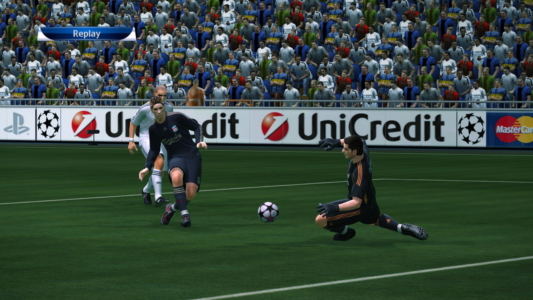
Models and likenesses are a mixed bag, but cover star Torres looks, moves and plays like the real thing, circa 2009-10.
It’s worth saying that my Eureka-this-is-not-so-much-fun moment re: PES 2010 came after several hours of solo play, during which I did indeed think it might turn out to be good. PES had a reputation for being quite tough, and it was generally acknowledged the series needed some fundamental changes for the current generation, so even though I wasn’t enjoying it much, I figured it was all part of the new challenge of a changed PES and was prepared to give it some leeway.
After all, it seemed that FIFA had indeed raised its game on the pitch, and PES was falling behind. Specifically, the movement of players remained slightly robotic, and they could face in one of eight directions, which still called to mind the earliest iterations of the series on the PSX. Also, the passing model seemed to have gone slightly awry and needed more precision. And by no longer being the leader on the pitch, the idiosyncratic presentation, which had previously been a forgiveable bugbear, was in need of some attention.
On the pitch, you do see the changes. Movement is less angular and passing is more solid and considered than in PES 2008, although at this point there’s still no power bar on ground passes. At the same time, it makes for a rather stodgy experience, with a significant time lag between button press and action (calling to mind FIFA 97, a contender in my mind for worst FIFA game) which makes any instinctive or nimble play impossible. Pinging passes about, beating a man in the box, or a quick snap shot: they’re not hallmarks of the action here. Goals mainly come from crosses and headers, or long range piledrivers, or occasionally you can play a counter attacking game with some success.
The definitive fist-pump *yes* feeling is too often absent, and under some circumstances you find yourself not wanting a goal, because you pressed the shoot button hours ago, what you wanted to happen hasn’t happened, and you don’t now want to wait for the ball to ricochet off your player’s head onto the pitch, have them chase after it for a while, and then unleash a full blooded toe punt. It’s rather like those occasions in the early ISS Pro Evolution games where a player should shoot with his left foot as the ball comes across his body but somehow he elects to slice it into the net with his right in most unrealistic and unsatisfactory manner.
There are good moments though: phases of patient and considered passing, where you appear to play decent (if slightly ponderous) football in order to fashion an opening. And on those occasions where counter-attacking works, you can destroy some strong opponents away from home. There are also late goals to save you from defeat or a 0-0 draw against weaker opposition, which are earned with a certain level of sweat and grim determination, as you force yourself not to get annoyed or impatient and give your team the best chance of retaining possession. Some tinkering with formations and tactics is necessary: one new development is the inclusion of player index cards, denoting special unique abilities that certain players possess and can be activated from the tactics screen. It sounds like a gimmick, and it was one that I was determined to ignore, until I became distracted by one of my central defenders constantly haring upfield and discovered that this was his particular special unique ability (which I turned off).
My chosen team was Liverpool, one of two licensed English teams available (Manchester United – boo! – being the other) and it was the squad assembled by Rafa Benitez that had just finished a close second in the league to United (at one stage they had led by seven points, at which point Benitez unleashed a bizarre press-conference rant (“I want to talk about facts”), which is often cited alongside Kevin Keegan’s “love it” meltdown as evidence of Sir Alex Ferguson’s mastery of mind games).
Beginning a Master League, the multi-season career mode with leagues, cups, player development, transfers and whatnot, long beloved by fans of the series, I created a parallel universe in which that team didn’t fall apart and finish seventh; in which Xabi Alonso isn’t missed at all, Alberto Aquilani isn’t injured and proves to be a perfectly adequate replacement, and Steven Gerrard and Fernando Torres still form a prolific attacking partnership. (Later developments included signing Ashley Young and, possibly unforgivably, Lee Cattermole. Sorry, but his stats were quite good!)
The football was quite Benitez like: dull, but effective, with plenty of 1-0 wins. We won the league with a low number of goals in both the for and against columns, and lost the cup final and Champions League final in barely credible circumstances (dominating the game then losing to a goal in the last minute of extra time in each case). I must also admit to only playing on the second highest difficulty level, a humiliating climbdown from my peak days, when it was the top level or nothing, but unavoidable due to the stilted nature of the action and my desire to avoid spending evenings playing out successive 0-0 draws while grinding my teeth into a fine powder.
Ah yes, we mentioned the Champions League there – the big license that PES desperately needed, and it’s all done quite well. Aside from meaning that FIFA doesn’t have it, the license brings all the qualifying teams, and all of that corporate branding (including that silly but catchy corporate anthem) that comes along with the tournament. It’s a far cry from the first Champions League tie-in, and even though that music, the presentation, the more elaborate preamble, and the different match ball shouldn’t make much difference, somehow the occasion of a big midweek European match is captured and the quality of the overall experience is somehow raised, even though it’s patently the same game and on-pitch experience. What can I say? Football can be, and often is, very shallow. (Incidentally, second-tier European competition, in the form of the Europa League, is also included).
Elsewhere, fans of the loveably-bonkers original menu music (of which there are plenty, given that our page celebrating the music of PES 2008 is by far our most visited, and indeed even attracted one of our very few unpleasant (and unpublished) comments, with one internet citizen taking issue with the tone of the piece and inviting me to throw myself under a train) will be disappointed to find a reversion to conventional licensed tracks here, with stuff from Stereophonics, Chemical Brothers, All American Rejects and others accompanying you on menu screens.
(A side-note: I do find it a bit odd that A Thousand Trees was one of the Stereophonics tracks to be included – despite being a fairly catchy slice of 90s indie rock, there’s a bit of a dark edge to the lyrics that makes it an odd choice for a mainstream football title, particularly given the subject matter. Singer Kelly Jones: “[A Thousand Trees] was about rumours spreading around a very small town and somebody’s reputation being basically burned to the ground. It was a football coach who did some very untowards stuff with younger kids. He had his name celebrated in wrought iron outside the football pitch. I remember coming past that and it had been ripped down in anger.”)
Set against those improvements to presentation is the general amateurishness still present elsewhere: the lack of licences for English teams; the silly made-up names and generic kits with stupidly large badges; and the unintentionally-amusing commentary. In a way, it’s all part of the series’ shonky charm, but given the desire for improvement in this area, the combination of the convincingly authentic and cheerily knocked-off content makes for a slightly uneven final product.
That the commentary is still so poor is surely not down to money, as there are professionals in the hot-seat (Jon Champion and Mark Lawrenson) but they’re asked to say phrases they would never use in real life. There are, for example, plenty of readily-available clichés to describe a player with high stamina rating (he’s got a great engine, covers every blade of grass, etc) but when Champion just says that a player has “tremendous stamina” it sounds like he’s making a double entendre about that player’s sexual prowess. Meanwhile, Mark Lawrenson’s assertion that a player could score with his head “all day long – and I do mean, all day” left me scratching my head all day long (and I do mean, all day). So if a 12 hour match were to take place, this player would be continually scoring headed goals? I don’t understand, Mark! I understood what you meant, figuratively speaking, until you clarified that you literally meant all day. And then I didn’t know what to think.
A brief mention for the Become a Legend mode, in which you take control of a single player on the pitch and attempt to guide him through a gruelling 20 year career as a professional footballer: I felt duty-bound to give it a go because a) it’s relatively new, introduced in PES 2009, and b) I realised that after I played New Star Soccer 5 the concept of a career mode for an individual player wasn’t the sole preserve of indie underdogs but had in fact been adopted by the corporate big boys as well. Given the general lack of guile and flair in the main game, this mode, as it appears in PES 2010, was always going to be a battle, and I’m sorry to say I did give up after a couple of hours or so. I may have bemoaned the ease with which you become a superstar in NSS 5 but the prospect of a prolonged grind at the lower levels here (which includes slogging through several dull training matches just to get a spot on the subs’ bench) simply didn’t appeal.
Coming back to a game that you remember for killing your love of a series and which you sold with some haste via eBay days after that realisation is bound to reveal that it probably wasn’t as bad as that association with those memories makes it seem. PES 2010 isn’t totally unenjoyable, and does represent progress in some respects, but too often it’s played with a clenched jaw, a grimace and frustration bubbling under the surface: moments of satisfaction threaten to convince you that the series has still got it, and with time and practice, the old magic will come back. But it never does. It’s a patchy and sporadically entertaining football game, the type that people like me bought in the mid-late 90s when they were bored of that year’s FIFA, but that’s a long fall from an essential annual purchase, which heralded the start of a year-long obsession with getting better and better. And the fact remains that no subsequent PES has been able to to revive those feelings. So, as we said all those years ago, it really is time to stop playing and do something else. Goodbye, old friend.

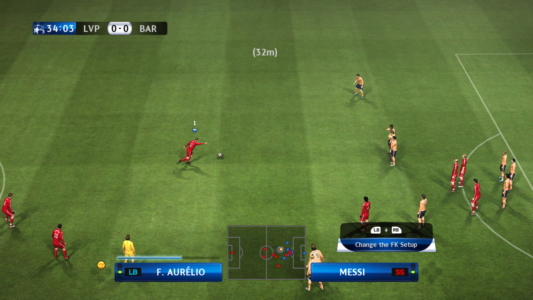
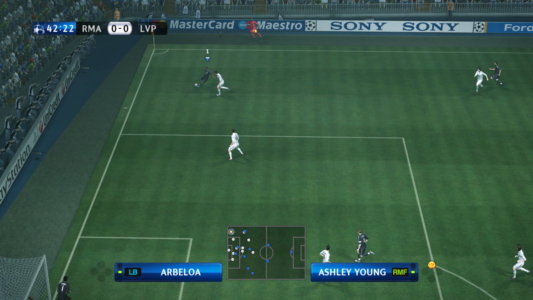
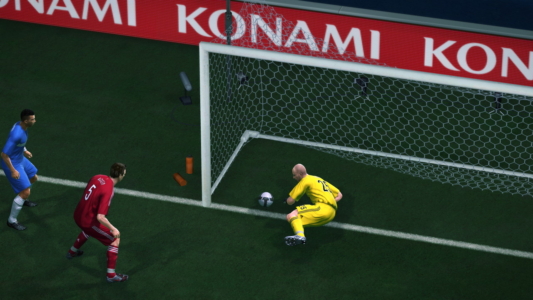
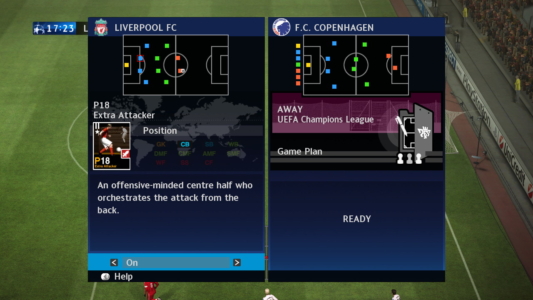
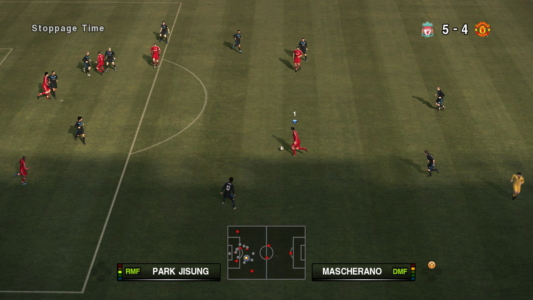
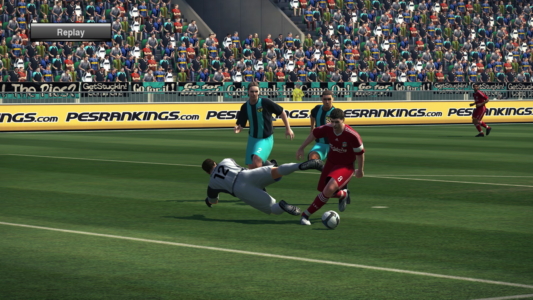
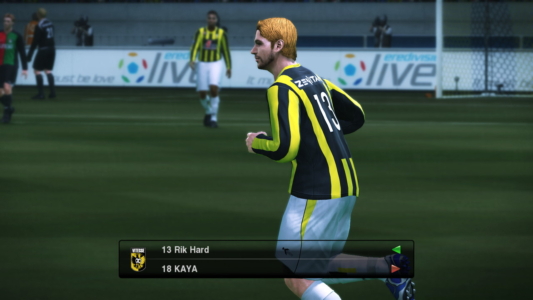

 Posts
Posts